Cite this document
(“Emotional and cognitive chalenges of adult college learners: Evolving Essay”, n.d.)
Retrieved from https://studentshare.org/english/1455961-open-reflection-paper
Retrieved from https://studentshare.org/english/1455961-open-reflection-paper
(Emotional and Cognitive Chalenges of Adult College Learners: Evolving Essay)
https://studentshare.org/english/1455961-open-reflection-paper.
https://studentshare.org/english/1455961-open-reflection-paper.
“Emotional and Cognitive Chalenges of Adult College Learners: Evolving Essay”, n.d. https://studentshare.org/english/1455961-open-reflection-paper.


